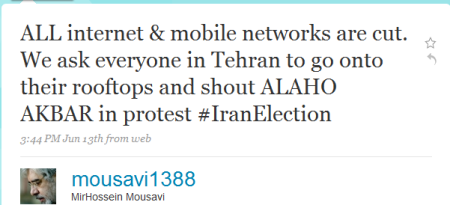
Early Friday morning in Tehran, 23-year-old Delara Darabi was executed in the Rasht prison in Iran for a crime that happened when she was 17. Human rights groups had been protesting and trying to save her from execution for months, since it is a violation of international law to execute anyone for a crime that occurred when they were a minor. Despite the protests, Iranian authorities executed her on Friday with no notice.
What is perhaps the saddest part of her story, however, is that the mainstream, traditional news media did not report the story at all. A Google News search on Delara Darabi revealed, as of late last night, a total of ZERO mainstream US news stories. The only stories about Delara as of last night were from Iranian and international sources, blogs, and human rights groups.
Today, the mainstream media started to pick up on it, with stories from the Los Angeles Times, BBC, United Press International, New York Times, and a few others. Still, at the time of writing this post there are only 206 news stories about Delara Darabi’s unjust execution. By comparison, there are currently 762 news stories about Matthew McConaughey, and 7,078 news stories about Arlen Specter.
So, how, you might ask, did word of the story first break? Who reported it first? The answer is: Darabi’s execution was first reported on Twitter. And then the first media outlet to pick up the story was none other than the epitome of new media, BreakingTweets.com, a news site which reports stories from around the world using Twitter for breaking news. BreakingTweets isn’t run by seasoned news pros, either — its founder and head is Craig Kanalley, a twentysomething journalism grad student trying to revolutionize the way we get our news, through the use of new media.
Breaking Tweets was paying attention to the Delara Darabi story, and they reported it more than a full 24 hours before the mainstream media.
Delara Darabi’s story should be seen as a case study of some of the challenges with our media system as it stands today:
Ethnocentrism still reigns supreme: stories with an “American” angle – like the imprisonment of American journalist Roxana Saberi in Iran – are more important than similar stories, like Delara Darabi’s, without the American angle. With Roxana Saberi, international media attention has been fierce — and because of that, so has international pressure on Iranian authorities. Had Delara Darabi had that kind of attention, she could have had a very different fate. But she didn’t get that attention – because she’s not American.
And new media won major points. Old media types who rail against new media, such as NYT’s Maureen Dowd and Matt Bai, who spent last week complaining about Twitter, should take note: the New York Times was shamefully far, far behind Twitter and new media in picking up this story.
Where are our media’s priorities? What is driving them to choose to write 7000+ of the same stories on Arlen Specter, and almost nothing about the international law-violating execution of an innocent young Iranian woman?
Perhaps it is because human rights stories just don’t sell as much as stories about high-intensity partisan clashes or Hollywood actors. Human rights stories, particuarly world news, may sell less copies or bring in few page views. But news isn’t supposed to be about the profit motive — it’s supposed to be about educating and informing the masses about the world around them. If the press is to act as an arbiter of what is news, they should be reporting on what matters, rather than more banal stories about the White House puppy or Michelle Obama’s garden.
Like this post? Click here to subscribe to this blog.




 (images:
(images:  Contrary to the news media’s coverage, the protests in Iran contesting the reelection of Mahmoud Ahmadinejad didn’t end when Michael Jackson died — though they are
Contrary to the news media’s coverage, the protests in Iran contesting the reelection of Mahmoud Ahmadinejad didn’t end when Michael Jackson died — though they are 




You must be logged in to post a comment.